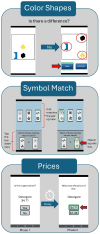Association of Subjective Cognitive Concerns With Performance on Mobile App-Based Cognitive Assessment in Cognitively Normal Older Adults: Observational Study
- PMID: 39903213
- PMCID: PMC11812482
- DOI: 10.2196/64033
Association of Subjective Cognitive Concerns With Performance on Mobile App-Based Cognitive Assessment in Cognitively Normal Older Adults: Observational Study
Abstract
Background: Subjective cognitive concerns (SCCs) may be among the earliest clinical symptoms of dementia. There is growing interest in applying a mobile app-based cognitive assessment to remotely screen for cognitive status in preclinical dementia, but the relationship between SCC and relevant mobile assessment metrics is uncertain.
Objective: This study aimed to characterize the relationship between SCC and adherence, satisfaction, and performance on mobile app assessments in cognitively unimpaired older adults.
Methods: Participants (N=122; Meanage=68.85 [SD 4.93] years; Meaneducation=16.85 [SD 2.39] years; female: n=82, 66.7%; White:n=106, 86.2%) completed 8 assessment days using Mobile Monitoring of Cognitive Change (M2C2), an app-based testing platform, with brief daily sessions within morning, afternoon, and evening time windows (24 total testing sessions). M2C2 includes digital working memory, processing speed, and episodic memory tasks. Participants provided feedback about their satisfaction and motivation related to M2C2 upon study completion. SCC was assessed using the Cognitive Function Instrument. Regression analyses evaluated the association between SCC and adherence, satisfaction, and performance on M2C2, controlling for age, sex, depression, and loneliness. Linear-mixed effects models evaluated whether SCC predicted M2C2 subtest performance over the 8-day testing period, controlling for covariates.
Results: SCC was not associated with app satisfaction or protocol motivation, but it was significantly associated with lower rates of protocol adherence (ß=-.20, P=.37, 95% CI -.65 to -.02). Higher SCC endorsement significantly predicted worse overall episodic memory performance (ß=-.20, P=.02, 95% CI -.02 to -.01), but not working memory or processing speed. There was a main effect of SCC on working memory performance at day 1 (estimate=-1.05, SE=0.47, P=.03) and a significant interaction between SCC and working memory over the 8-day period (estimate=0.05, SE=0.02, P=.03), such that SCC was associated with initially worse, then progressively better working memory performance.
Conclusions: SCCs are associated with worse overall memory performance on mobile app assessments, patterns of cognitive inefficiency (variable working memory), and mildly diminished adherence across an 8-day assessment period. Findings suggest that mobile app assessments may be sensitive to subtle cognitive changes, with important implications for early detection and treatment for individuals at risk for dementia.
Keywords: Cognitive Function Instrument; MCI; aging; app-based; applications; assessment; cognition; digital cognitive assessment; digital health; elderly; geriatrics; gerontology; mHealth; memory; mild cognitive impairment; mobile app; mobile health; mobile monitoring of cognitive change; mobile phone; older adult; preclinical Alzheimer disease; preclinical dementia; remote; subjective cognitive concerns; subjective cognitive decline.
© Caroline O Nester, Alyssa N De Vito, Sarah Prieto, Zachary J Kunicki, Jennifer Strenger, Karra D Harrington, Nelson Roque, Martin J Sliwinski, Laura A Rabin, Louisa I Thompson. Originally published in JMIR Aging (https://aging.jmir.org).
Conflict of interest statement
Figures



Similar articles
-
Psychometric and adherence considerations for high-frequency, smartphone-based cognitive screening protocols in older adults.J Int Neuropsychol Soc. 2024 Oct;30(8):785-793. doi: 10.1017/S1355617724000328. Epub 2024 Sep 20. J Int Neuropsychol Soc. 2024. PMID: 39301587
-
A highly feasible, reliable, and fully remote protocol for mobile app-based cognitive assessment in cognitively healthy older adults.Alzheimers Dement (Amst). 2022 Apr 5;14(1):e12283. doi: 10.1002/dad2.12283. eCollection 2022. Alzheimers Dement (Amst). 2022. PMID: 35415201 Free PMC article.
-
Validation of a Remote and Fully Automated Story Recall Task to Assess for Early Cognitive Impairment in Older Adults: Longitudinal Case-Control Observational Study.JMIR Aging. 2022 Sep 30;5(3):e37090. doi: 10.2196/37090. JMIR Aging. 2022. PMID: 36178715 Free PMC article.
-
"Cognitive" Criteria in Older Adults With Slow Gait Speed: Implications for Motoric Cognitive Risk Syndrome.J Gerontol A Biol Sci Med Sci. 2024 Apr 1;79(4):glae038. doi: 10.1093/gerona/glae038. J Gerontol A Biol Sci Med Sci. 2024. PMID: 38349795 Free PMC article. Review.
-
Screening for Cognitive Impairment in Older Adults: An Evidence Update for the U.S. Preventive Services Task Force [Internet].Rockville (MD): Agency for Healthcare Research and Quality (US); 2013 Nov. Report No.: 14-05198-EF-1. Rockville (MD): Agency for Healthcare Research and Quality (US); 2013 Nov. Report No.: 14-05198-EF-1. PMID: 24354019 Free Books & Documents. Review.
References
Publication types
MeSH terms
Grants and funding
LinkOut - more resources
Full Text Sources
Medical
Research Materials

